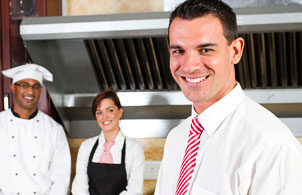
Hotel and restaurant managers handle the day-to-day operations of a business, which include marketing, hospitality, accounting, insurance, and food service. Here are a few qualities that effective hotel and restaurant managers have in common:
- Flexible: You are productive despite any changes in the hotel or restaurant.
- Creative: Working in hospitality often requires that you think outside of the box.
- Dependable: A lot of employees rely on you to be organized and offer advice, and customers rely on you for great service and food.
- Energetic: The hospitality and food industries are fast-paced with demanding hours.
"I chose to further my education and accounting knowledge with ICS Canada while working as an accounting clerk, which allowed me to move up within the company at which I am currently working. Studying with ICS Canada was a great experience, and the instructors were very helpful when it came to resolving any issues I had while studying."
- Sean S., ICS Canada graduate
"I have taken three diploma courses with ICS Canada. It has been very rewarding and challenging. I love to increase my knowledge level and share experiences. ICS Canada is great. Enrol! The contact with them is always very pleasant. You feel like a part of the ICS team."
- Connie K., ICS Canada graduate
Your program includes:
- Customized payment plans with 0% interest
- Learning aids
- Study Planner App to customize your study plans and keep track of your progress
- Instructional support from our experienced faculty
- Your personalized online student homepage and learning portal
- Exclusive access to ICS Canada’s Student and Alumni Facebook Group
- Additional resources such as our online library and career guidance from Career Cruising
Is there a final exam in the Hotel and Restaurant Management program?
There is no final exam for the Hotel and Restaurant Management program. Your overall grade is based on the average of your lesson exam scores.
More FAQs >
